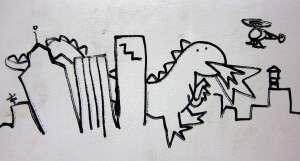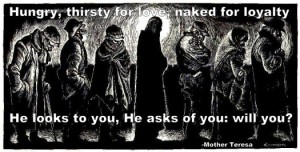-
Visions
 A vision is a seeing of the future, powerful enough to help create that future. Envision what could be with me that we might re-create what is.
A vision is a seeing of the future, powerful enough to help create that future. Envision what could be with me that we might re-create what is.I see a city that would welcome the homeless as neighbors and equal citizens
I see a city that would create space for everyone to live, without harassment, without fear.
I see a time when parents would no longer use the poor as a warning against laziness, but use their teaching time to spread compassion.
I see green spaces where the poor may sleep and the housed move freely among them, without fear, without anger.
I see a place where those who cannot be hired can work and be paid in a balance between their ability an their liability.
I see a time when no one is measured by the size of their paycheck, or the value they give an employer, but by the beauty they create and the depth of compassion they show.
I see a county that places people before property, that puts need before power, equality before class prejudice.
I envision a place that will first ask, “what do you need?” before, “This is what we will do.” An elected body who has lived with the poorest so that they might truly represent all the citizens and not just a select group.
I envision a law enforcement that stirs respect and not fear. Officers who will only respond to crimes, not whines concerning people they refuse to understand.
I see a city where the highways are used to bring food to the hungry, warmth for the cold, shelter for the wet, bathrooms and showers for those who lack hygiene. I see a government who will freely provide this, because their citizens are in need, and for no other reason.
I speak into being a community that loves, that provides, that does not hold to an arbitrary distinction of “deserving” and “undeserving” but is generous because they want to be known to the world as a place of giving and grace.
-
Disability
 You have a work history, but something went terribly wrong. Perhaps it’s nothing physical, but you are no longer able to function. You do all you can to fix it, but you end up on the street anyway. You hear from someone to apply for disability. You apply. You are denied.
You have a work history, but something went terribly wrong. Perhaps it’s nothing physical, but you are no longer able to function. You do all you can to fix it, but you end up on the street anyway. You hear from someone to apply for disability. You apply. You are denied.Then someone tells you that everyone is denied disability at first, so you appeal. You get a lawyer– if they take your case it’s likely you will win your appeal. They put you through a psych evaluation, they gather up witnesses, the look at your work history. After three years, you get your day in court.
The judge is kind, but he has his business to do. He listens to your supporters, perhaps a friend or two. They all say the same thing: “Can’t function” “Can’t work with others” “Can’t be on time”… Failure, failure, failure. You hold your head high, not listening, not believing, because you can’t accept that this is you.
But the judge believes the reports, the testimony. He approves your disability. After the trial, when you are alone, you weep, because now it is legally proved what you had heard from those who never believed in you: you are worthless.
After a number of months you get the money. You get an apartment. You escape some of the dreadful, deadening stress. And you realize you can do something with your life. You volunteer, you do something positive in your life. You spend the rest of your life disproving what was spoken about in that room.
-
Three Reasons for Poverty?
This is a guest post by Nigel Branken, who, with his family, ministers to the poor in South Africa. He speaks out against the continuing prejudice against the coloreds in that country, and lives out his convictions by assisting people and helping them through the courts.
Nigel offers us some great wisdom:
3 arguments that I constantly hear about the reasons people are poor…
- People are poor because they are stupid;
- People are poor because they are lazy;
- People are poor because there is just not enough in the world for everyone.
You hear it presented like this…
- The solution to poverty is education,
- If people work harder they can break out of poverty
- If we want to deal with poverty we need to grow the economy mostly through entrepreneurship and job creation.
While all of the above, education, hard work, entrepreneurship, job creation and economic growth are all good and help in some way, these arguments ignore and sustain the main reasons we have such obscene levels of poverty namely the greed of the ultra rich, their success being dependent on an exploitable work force, together with all of our combined apathy and acceptance of the status quo.
Not having an education is used as a justification to exploit people and pay them less than what is required to live with any dignity. “If they were more educated they would be paid higher wages” is just another way of saying “I have employed you because I can get you at a super cheap price and make massive profits from you.”
The hardest working people I know are the poorest. They work long hours for 6/7 days a week while never being able to afford a holiday. Their companies strictly control and limit their lunch and tea breaks. They are kept at maximum production levels on the brink of exhaustion for as long as they can be productive and are often churned out and replaced as soon as their productiveness ceases to be helpful.
Growth in the economy hardly ever translates into a reduction in poverty as most new wealth goes to the already rich. This is why inequality globally is growing not shrinking. The ultra rich keep taking more and using that more to demand more from the poor. Job creation programmes which pay minimum wages hardly ever translate into a real reduction in poverty. Entrepreneurship, despite being spoken of as a solution is also not encouraged in reality. The rich do not really want the poor to start their own businesses. Limited access to capital and excessive regulations at the entry level normally provide sufficient barriers to entry so the majority are kept without an escape route from poverty, thereby maintaining an available exploitable work force for the ultra rich.
If you look at the ultra rich, it is hardly ever their hard work, education or the growth of the economy that has led to their riches. Their riches are normally built on the backs of the poor. They are dependent on the poor. In addition, the rules are stacked in their favor and there is also a combination of luck, opportunity, and connectedness.
Perhaps the most revealing reason these arguments are used is because they require nothing or very little from the ultra rich. The responsibility for poverty is placed in the hands of government or the exploited themselves.
When you suggest that perhaps there could be a little more even distribution of profits you are labelled a communist, a socialist, a leftie or a liberal. You are told that only free market capitalism works despite the fact that there is very little freedom in the markets. The rules favor those who have already made it.
No current political party will be able to deliver the change we need. Most political parties have already been captured by the ultra wealthy. Our governments have already mostly been bough and act in the interests of a few. We are already mostly oligarchies. The change which is required will take a grassroots movement of active citizens who are not only fed up with the status quo, but also prepared to work for change.
If we are going to move towards a more just world, we need to dream while we are awake and actively pursue our dream by demonstrating it is possible around us and advocating for structural change.
Here is my starting statement towards the world we as a family dream of… Perhaps you can add yours below…
“We are a rather ordinary family doing some extraordinary things. We believe as Christians that God is extremely concerned with the brokenness in our city and nation and that He has called each one of us to get involved in making a difference. To bring change, we need to see the future, prepare for the future and then become the future… or in the words of Ghandi “we must become the change we want to see in the world”.
We want to see a world in which the rich do not tolerate extreme poverty and inequality. We want to see many people actually laying down their lives of comfort and convenience for the sake of bettering the lives of others. Seeing people freed from poverty, inequality, racism and exploitation is more important than fulfilling our lust for more things! We want to be part of a society in which people are valued more than things. We want to see the god of consumerism in South Africa bowing it’s knee to a love motivated revolution which results in freedom from oppression and exploitation. We want to see this for all people, regardless of class, citizenship, race or religion.
We dream of equality in every sector of society. We believe that if the education system is not OK for a rich kid, it is not OK for a poor kid. The same goes with healthcare, housing, security. The same goes for rural kids and inner city kids. The same for black kids and white kids. We are not more valuable than the least valued in our society. We are doing our lives in a new way.
We are going to live our dream and see this reality briefly described above happening around us. We hope others will join us and this will happen around them too. Who knows, very soon, the world can be a different place!
-
Kindness Creates Kindness
 I note that there are many, many people who fear the homeless. This is because they don’t recognize that the homeless are their neighbors. Sure, we have some irritating neighbors, even bad ones, but as long as we are polite to our neighbors, they will be polite to us. If we are kind to them, they will be kind to us. Here’s some ideas to be a neighbor to the homeless:
I note that there are many, many people who fear the homeless. This is because they don’t recognize that the homeless are their neighbors. Sure, we have some irritating neighbors, even bad ones, but as long as we are polite to our neighbors, they will be polite to us. If we are kind to them, they will be kind to us. Here’s some ideas to be a neighbor to the homeless:- If you see a new homeless person in your neighborhood, offer them a cup of coffee
- Ask them how they are doing each time you see them
- Talk about neighborhood issues—traffic, local news, new buildings, etc.
- If they look unhappy, ask them why
- If you have an issue with them (trash, perhaps), go and talk to them. Don’t force the police to mediate for you.
- Once you get to know them, and are comfortable, invite them to dinner. It’s fun!
- If they offer you food or help, please take it. It gives them respect, and you might very well need the help.
-
3733 N Williams Ave
Portland, OR 97227
503.888.4453
AnawimCC@gmail.com
Ministry Locations and Times »












